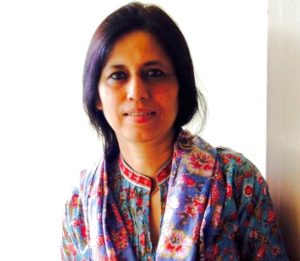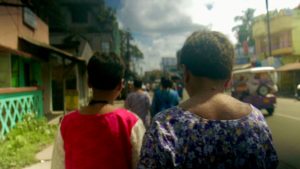By Shoma A. Chatterji
According to a National Mental Health survey (2018), approximately 150 million people in India need care for their mental health conditions. West Bengal has a meagre 2000 beds in the state mental hospitals for over 1.25 crore of people with mental health conditions.
 A recent media report about Calcutta Pavlov Hospital, one of the prominent mental hospitals in West Bengal, revealed that around 13 women inmates were kept inside two locked rooms. Around nine patients were inside one room while four others were locked up inside another room. Both the rooms were dirty and many of the inmates developed infections while injury marks were spotted on others.
A recent media report about Calcutta Pavlov Hospital, one of the prominent mental hospitals in West Bengal, revealed that around 13 women inmates were kept inside two locked rooms. Around nine patients were inside one room while four others were locked up inside another room. Both the rooms were dirty and many of the inmates developed infections while injury marks were spotted on others.
The tragedy is that even when some inmates are cured or were admitted for minor issues, their families refuse to take them back. They are victims of the violation of human rights and the most marginalised in the population.
Three Sisters explores one such real story. It follows the journey of three sisters of different ages. Shikha and Seema are two sisters, who spent 20 long years in a mental home. They were later joined at the asylum by the ever-smiling Rupashi. No one from their families came to visit them. They laugh a lot and talk sensibly. One of them is married; her husband left her at the home and never came back to enquire after her. She says she is looking forward to meeting her children, one boy and one girl, who must have grown up by now. The sisters take the refusal of their families to accept them back with great dignity. They know they will never be back but pretend that they will.
 Putul Mahmood is currently associate professor and Head of the Department of Direction and Screenplay writing at the Satyajit Ray Film and Television Institute, Kolkata. As a documentary filmmaker she is committed to less highlighted social issues mainly around women. She has also directed Man of Silence :Sardar Vallabhbhai Patel for Films Division, I Shoot U, and Atasi besides Three Sisters.
Putul Mahmood is currently associate professor and Head of the Department of Direction and Screenplay writing at the Satyajit Ray Film and Television Institute, Kolkata. As a documentary filmmaker she is committed to less highlighted social issues mainly around women. She has also directed Man of Silence :Sardar Vallabhbhai Patel for Films Division, I Shoot U, and Atasi besides Three Sisters.
Three Sisters is a part of a series of films under the title Love in the Time of Madness of which, the others are still to be shot or screened.
In the film, Ratnaboli Ray, founder of NGO Anjali Mental Health Rights Organization, Kolkata, along with another woman, is seen escorting them from the mental home to their respective homes.
Says Mahmood, “In 2007, Ratnaboli Ray requested me to shoot a small interview-based film with two sisters Shikha and Rupashi, who were left behind by their family in the government -run Lumbini Park Mental Asylum. Ray and her team at Anjali worked hard at rehabilitating them. A short six-minute film Two Sisters was made primarily to facilitate their return.
“Ten years later, when Ratnaboli and I got together again to shoot the film Atasi which was part of a series of films, I asked her if the two sisters had gone home. She told me it did not happen at all but, in fact, a third sister had been abandoned too. So, two sisters were now three sisters! Imagine that they were in the asylum for more than 20 years!”
 Adds Mahmood, “My engagement with women and ‘madness’ started years ago. I prefer to use the word ‘madness’ rather than the politically correct ‘mental illness’ as it allows me to encompass so much more than just a clinical affliction. The word madness contains within it along with the ‘illness’ aspect also the possibilities of a parallel vision of the world, a rebellion and much else touched upon in the world of art and poetry.”
Adds Mahmood, “My engagement with women and ‘madness’ started years ago. I prefer to use the word ‘madness’ rather than the politically correct ‘mental illness’ as it allows me to encompass so much more than just a clinical affliction. The word madness contains within it along with the ‘illness’ aspect also the possibilities of a parallel vision of the world, a rebellion and much else touched upon in the world of art and poetry.”
Three Sisters is as daunting as it is tragic. They are seen accepting their position or non-position in their lives, smiling all the time, and with a certain dignity that is rare for the social positions they are in.
Director Mahmood and her team along with a few social workers of Anjali travelled with the sisters to their home near the Bangladesh-India border. The entire film was shot within one day from morning till late into the night without a single break intercut with the director’s conversations with them. The film that came out of this deeply emotional interaction turned into a documentary where it is the content that overrides everything else like aesthetics, technical finesse and the rest.
Mahmood underscores the relatively unacceptable reality of the lines between madness and sanity being rather blurred and this comes across quite tellingly in Three Sisters. “In my childhood, I witnessed madness and family rejection from close quarters. A mentally ill aunt turned up at our house just before my matriculation exams and we had to send her back to her own family which was keen to institutionalise her. Later they did admit her in an asylum where she spent many years till her death. This incident pricked my conscience and much later I was drawn to the possibilities of exploring more how madness affects women. It’s a kind of double whammy- doubly marginalised existence- and I was keen to work as an instrument in making this voice heard,” she says.
Watching two of the films in the series, namely Atasi and Three Sisters, one can find a locked window suddenly thrown open to a world existing beyond the comfort zone. Cinema is not just about entertainment. It is also about information and education on the gross violation of human rights in the sphere of personal and private lives. Three Sisters bears this out.
TRANS WORLD FEATURES (TWF)



